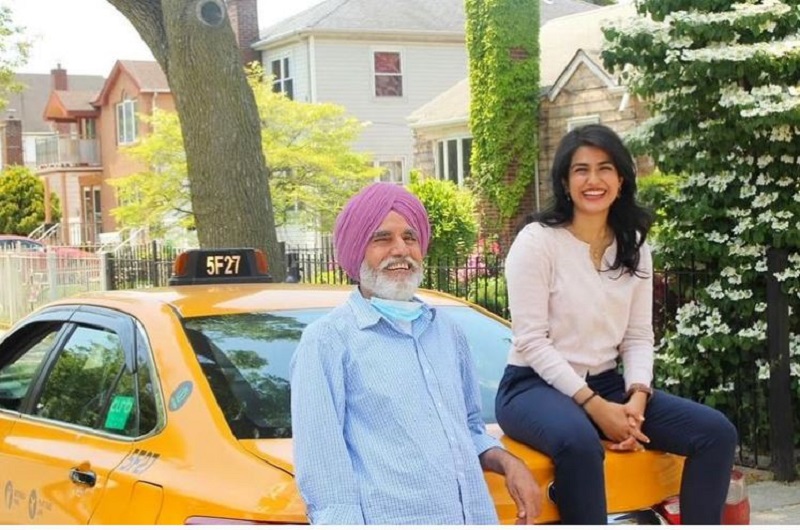
Former city council candidate for Queens says it’s important for immigrants to be vocal about cabbies’ rights
New York City is known for its high sky rises as much as it is known for its iconic yellow taxis. The yellow cabs, a quintessential New York feature has been immortalized in countless movies and TV series.
But since Oct. 20, the cab drivers have been sitting on a hunger strike outside the City Hall. The cabbies, 94 percent of whom are immigrants, are protesting the city’s $65 million medallion debt relief program, citing that it falls terribly short.
They are joined by Bhairavi Desai, director of the New York Taxi Workers Alliance, an organization that represents more than 20,000 taxi drivers in New York.
Not just the drivers, activists, but some city officials and some common people too have also stepped ahead to join the protesting taxi workers.
Jaslin Kaur, former city council candidate for Queens has been on the forefront of taxi medallion debt crisis. A daughter of a New York taxi driver herself, Kaur has been on a hunger strike along with the drivers.
Amidst her protest duties and active campaign, she spoke with the American Bazaar on the ongoing hunger strike, the medallion debt crisis and why it is important for immigrants in America to be vocal about taxi drivers’ rights.
Read: Taxis beat ridesharing services in New York City: Morgan Stanley data (July 11, 2016)
AB: Tell us about the medallion crisis affecting New York taxi workers. What are they protesting against and what has been the state’s response so far?
JK: Around 2001, then Mayor (Mike) Bloomberg was looking to fill a $4 billion budget gap. So, the city auctioned off thousands of medallions, worth at least $200,000. It was a chance for immigrant New Yorkers to own their business and operate their own vehicle.
But over time, predatory lenders began getting involved in the medallion scheme, inflating market prices, so medallion value skyrocketed to around $1 million. It was bound to crash.
NYC let Uber and Lyft into the city – taxis could not compete. And so the medallion system collapsed and now many drivers who bought their medallions years ago owe an average $500,000 to their lenders.
Now the New York Taxi Workers Alliance, a group of 25,000 members are demanding the city restructure the loans to make the agreements fairer.
It includes maximum monthly payments of $800 so drivers can take higher wages and most importantly: a city backed guarantee so drivers are protected from defaulting on the loans.
So far, Senate Majority Leader Chuck Schumer, 50 plus state legislators and 12 members of US Congress support the plan, including Alexandria Ocasio-Cortez. We hope to meet with mayor De Blasio soon to get our plan approved as soon as possible.
AB: Why did the New York taxi drivers decide to go on hunger strike. What called for such an extreme measure?
JK: The New York Taxi Workers Alliance, which represents over 25,000 taxi workers, began a hunger strike on Oct. 20, after camping outside New York City Hall 24/7 for almost one month.
We escalated to a hunger strike because we already know that medallion debt is a situation of life and death. So, we refuse food for as long as it takes to win the debt relief we deserve.
AB: Talking about the medallion debt crisis, explain what went wrong and how did the situation go out of hand?
JK: The medallion debt crisis has been decades in the making, with many predatory lenders providing medallions, which are licenses to operate a yellow cab in New York City.
Between unfair lending agreements and the city allowing apps like Uber and Lyft into NYC unregulated, the taxi market crashed. And so thousands of families across the city went into an average debt of $500,000.
The strike is about winning a debt relief plan that protects drivers from defaulting on these loans with a city backed guarantee policy and making NYC affordable once again for working class immigrants.
AB: The issue must be of special significance for you as your dad has been a yellow cab driver in NYC. Tell us about how medallion debt has affected immigrant families?
JK: This is especially close to my heart as my dad has been driving the yellow taxi for almost 30 years. The impact of medallion debt impacted our family well before the Covid-19 pandemic.
There is no retirement plan for drivers like my father. So, if we don’t win now, it will be passed on to my generation.
Read: ‘I lost everything’: Desperate N.Y.C. taxi drivers begin hunger strike for debt relief (October 21, 2021)
AB: So, a majority of New York cabbies are immigrants, particularly many are South Asians. What has been the involvement of the South Asian community?
JK: Yup, so the majority are immigrants, about 94 percent. Out of which, about 40 percent are South Asian.
NYC will have the first group of South Asian City Council members elected to office this year and they have stood tirelessly for taxi drivers, even going on hunger strike themselves.
I think it demonstrates that we have a lot of work to do to support working class South Asians who work low wage jobs: taxi drivers, cashiers, delivery service.
But I am hopeful that elected officials like Zohran Mamdani (New York State Assembly member from District 36) and local organizations like Desis Up & Moving (DRUM) are standing up for taxi drivers. It gives me a lot of hope.



